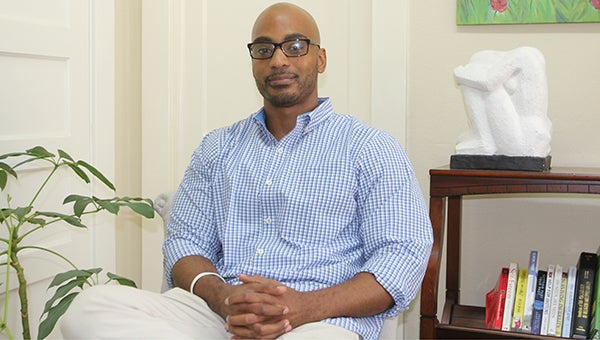Duboise sees counseling as a ministry
Published 9:46 am Monday, May 2, 2016

- Joshua Duboise sits in an office at Grace Christian Counseling. Duboise, who has been with Grace for about five years, sees his service as a ministry to help families deal with their problems and overcome them.
Websters Dictionary defines a counselor as “a person who counsels; an advisor, specifically one who advises students or clients regarding educational and occupational alternatives, personal problems.”
Joshua Duboise sees that role a bit differently.
“I see counseling as a ministry,” he said.
“My role as a counselor is to advocate for my clients, to encourage, to empower, to provide them with additional skills options, to be a resource for them,” he said. “What I do as a counselor is provide my clients with the tools they need to overcome their crisis; to better overcome their situation. I can just provide the tools. They’re responsible for putting the tools to work, so any change that happens is the change the client put into it, using those tools.”
And a lot of the interaction with the client and the results, he said, “Depends on the relationship of the client and the counselor, but that relationship is nonjudgmental; that relationship is genuine. If there’s a good rapport between the counselor and the client, and there’s trust and transparency, that alone can help foster much change, along with the client putting in the work outside the session and being responsible for their progress.
“One of the biggest misconceptions about counseling is people believe counselors have all the answers, and we don’t. Counselors walk with their clients down a path of change and support. It’s definitely a team effort. My role not only affects the client, but the client definitely has an effect on me. I’ve learned a lot. I try to make myself learn something from every person that walks through that door.”
Duboise is a marriage and family counselor at Grace Christian Counseling and serves as the youth minister at Bypass Christian Church of Christ.
He’s lived here five years with his wife Diamond and their children, Gavin, 1, and London, 5. He said his family are the real heroes.
“My wife sacrifices me as her husband daily so that I can meet the needs of the community,” he said.
“My children sacrifice their father daily so I can make myself available to the community. I definitely could not make do this without their support, without their encouragement. Without them, it would be almost impossible for to commit myself to such a demanding calling.”
A native of Akron, Ohio, Duboise graduated from Freed-Hardeman University with a degree in Bible, and holds a master’s degree in marriage and family counseling from Mississippi College.
He got his degree in counseling on the advice of a preacher he worked with in Tennessee, Samuel Jones.
“He told me if I’m going to be a preacher, I needed to know how to counsel, because many preachers are doing marriages and families a disservice by not knowing how to properly provide counsel,” Duboise said. “He recommended to me to get my masters in counseling so I’m not causing any harm or damage to families in the ministry.
“I’ve heard a lot of stories, and I think there are many preachers, pastors, religious people, who mean well, who have pure motives when they take on the role as counselor, but without the professional backing, without the research base, the education, they’re resources are very limited.”
It was during his work toward his masters that Duboise came to Grace as an intern. When he graduated, he decided to remain at Grace.
Counseling, he said, is very demanding. “It can be draining at times, investing so much time and energy, so much resources into people,” he said, adding there have been occasions when he’s thought about the career he chose.
“There are times when counselors give out. They call it caregiver fatigue, and it involves giving a lot of yourself to each person who walks into your office,” he said.
Grace is involved with community counseling, “So we see a plethora of mental health issues, family issues, marriage issues, even medical issues, so I really never know what’s going to walk through the door. There may be clients who are just wanting to manage potential crises when they occur.”
The most common problems, he said involve stress management, anger management, depression, anxiety and addiction. “It’s never the same day twice. (But) What I see mostly will probably be addiction, family dysfunction, trauma, and depression.
“My goal is to empower and impact families to make positive change and to disrupt generational cycles of abuse and dysfunction.”
Besides his work at Grace, Duboise has worked with other community agencies, doing volunteer and contracting services with the CAP Center, where he’s taught parenting classes and domestic violence classes, and he’s also partnered with Haven House.
He’s also given presentations on domestic violence at local middle and high schools.
“Unfortunately, a lot of these students experience domestic violence second hand, so they are very familiar with what it is,” he said “I always start off the class with (asking) who can tell me what domestic violence is, and the majority know exactly what it is. Some know what it is — they can describe it without labeling it as domestic violence. For many students, it’s a normal dysfunction of the family; it’s common place.”
Having grown up in a domestic violence home, he said, he can relate to the students.
He also volunteered with Lifting Lives Ministry, which is building a shelter for homeless families.
“The goal to provide counseling to those families that are going to be in crisis once that facility opens up,” Duboise said. “They are going to need resources, support and encouragement. They’re going to need solutions, and I want to be there as an extension of Grace to provide services to those families.”
He said he plans to continue helping people as a counselor, “And I really don’t see myself not working with families. I believe this is my calling.”
“Families are the fabric of this society. When the families are healthy, the school system is healthy, the communities are healthy, the workplace it healthy, the government is healthy, the military’s healthy. Families have an affect on every aspect of human life and human development. My goal is to help families function as well as possible.
“And most importantly, Ephesians 2:10 says that ‘I am God’s handiwork, created in Christ Jesus to do good works.’ So any good that I do is owed to God. It’s not me; it’s him working through me as his instrument.”






